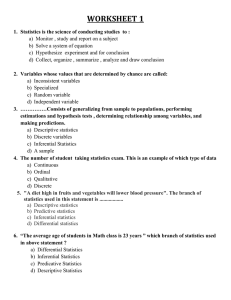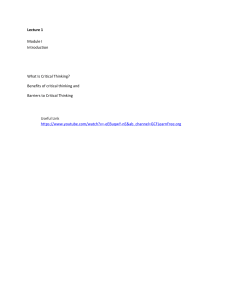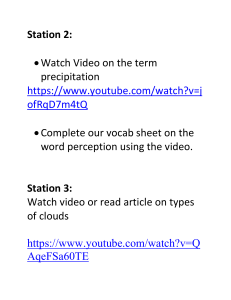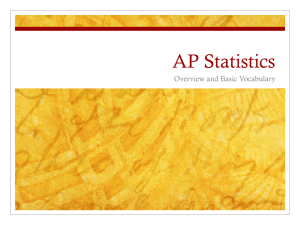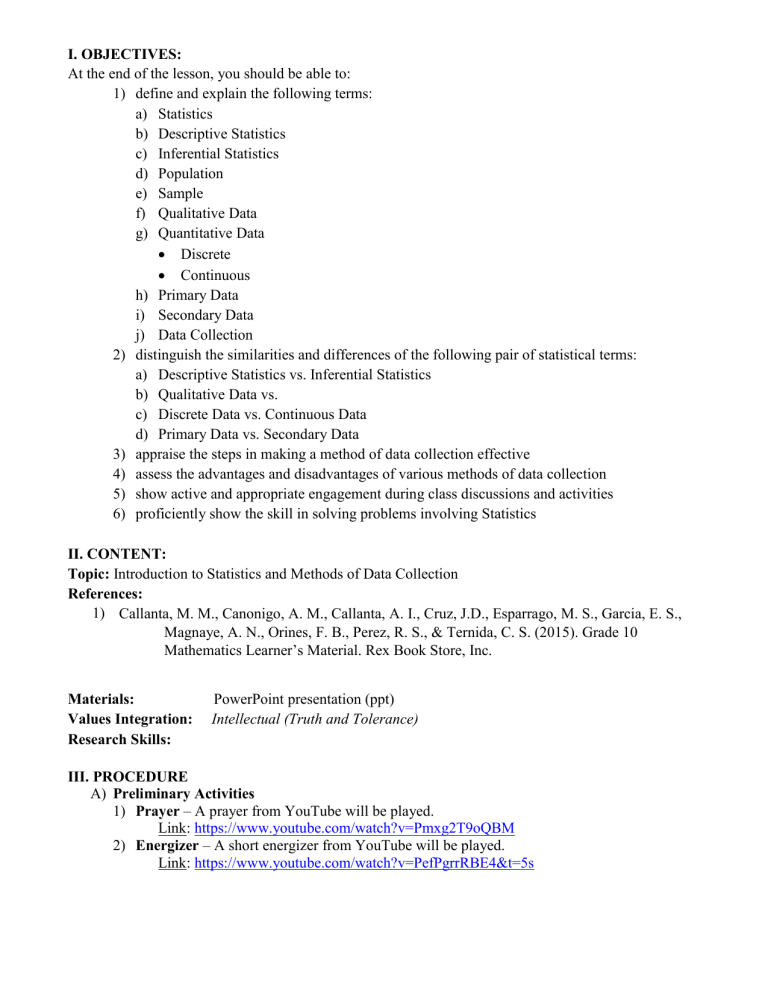
I. OBJECTIVES: At the end of the lesson, you should be able to: 1) define and explain the following terms: a) Statistics b) Descriptive Statistics c) Inferential Statistics d) Population e) Sample f) Qualitative Data g) Quantitative Data Discrete Continuous h) Primary Data i) Secondary Data j) Data Collection 2) distinguish the similarities and differences of the following pair of statistical terms: a) Descriptive Statistics vs. Inferential Statistics b) Qualitative Data vs. c) Discrete Data vs. Continuous Data d) Primary Data vs. Secondary Data 3) appraise the steps in making a method of data collection effective 4) assess the advantages and disadvantages of various methods of data collection 5) show active and appropriate engagement during class discussions and activities 6) proficiently show the skill in solving problems involving Statistics II. CONTENT: Topic: Introduction to Statistics and Methods of Data Collection References: 1) Callanta, M. M., Canonigo, A. M., Callanta, A. I., Cruz, J.D., Esparrago, M. S., Garcia, E. S., Magnaye, A. N., Orines, F. B., Perez, R. S., & Ternida, C. S. (2015). Grade 10 Mathematics Learner’s Material. Rex Book Store, Inc. Materials: Values Integration: Research Skills: PowerPoint presentation (ppt) Intellectual (Truth and Tolerance) III. PROCEDURE A) Preliminary Activities 1) Prayer – A prayer from YouTube will be played. Link: https://www.youtube.com/watch?v=Pmxg2T9oQBM 2) Energizer – A short energizer from YouTube will be played. Link: https://www.youtube.com/watch?v=PefPgrrRBE4&t=5s B) Lesson Proper 1. ACTIVITY PHASE LEARNING ACTIVITY A) GAINING ATTENTION The students will watch a short video about “Introduction to Statistics” and will answer one question. This will be given to students before the synchronous session. Link: https://www.youtube.com/watch?v=SFPGVTThJNk&t=3s Question: What did you learn from the short video about "Introduction to Statistics"? Enumerate and describe your learnings. B) INFORMING LEARNERS OF OBJECTIVES 1) define and explain the following terms: a) Statistics b) Descriptive Statistics c) Inferential Statistics d) Population e) Sample f) Qualitative Data g) Quantitative Data Discrete Continuous a) Primary Data b) Secondary Data c) Data Collection 2) distinguish the similarities and differences of the following pair of statistical terms: a) Descriptive Statistics vs. Inferential Statistics e) Qualitative Data vs. f) Discrete Data vs. Continuous Data g) Primary Data vs. Secondary Data 3) appraise the steps in making a method of data collection effective 4) assess the advantages and disadvantages of various methods of data collection 5) show active and appropriate engagement during class discussions and activities 6) proficiently show the skill in solving problems involving Statistics C) STIMULATE RECALL OF PRIOR LEARNING Students will answer the question below: Prior to watching the short video about “Introduction to Statistics,” what comes to your mind when you hear the word “Statistics”? Give at least one word. LEARNING MATERIAL 2. ANALYSIS PHASE LEARNING ACTIVITY LEARNING MATERIAL D) PRESENTING EXAMPLES or INSTANCES OF THE NEW LESSON Note: Transitions and animations were applied in several parts of the ppt that will be used to appear hidden while students are inferring the possible answers for the questions asked by the teacher during the discussion. 3. ABSTRACTION PHASE LEARNING ACTIVITY LEARNING MATERIAL E) MAKING GENERALIZATIONS AND ABSTRACTIONS ABOUT THE LESSON b 4. APPLICATION PHASE LEARNING ACTIVITY F) FINDING PRACTICAL APPLICATIONS OF CONCEPTS LEARNING MATERIAL

